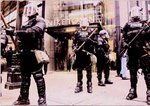Labor Day has long been known as the end of summer, the mark of a three day weekend, and a day filled with many barbeques, family outings, and lake-house trips. What many forget, though, is what exactly Labor Day is celebrating. It is not simply the “end of summer,” but rather a celebration of the working man and women in America and all he/she has accomplished. In addition to the latter, I would also like to add an additional observance: the constant class struggle between rich and poor, employee and employer. This struggle has not ended recently and will not end soon, it has been ongoing for over five millennia and will continue one throughout the millennia unless labor recognizes the struggle as more then simply a matter of better wages and job security, but the rather for the end to the oppressive capitalistic society.
A common misconception among the mainstream has evolved naturally in order to protect itself from a rebellion: that a capitalist society, by nature, awards its people with a better way of life as long as the economy flourishes. This concept of economics, to a capitalist, is based on Gross Domestic Product, and Employment. The latter, by no means, represents an accurate survey of economic status.
In much the same way, propaganda has engrained itself into high school textbooks, the every day working man, and both political parties. These capitalist theories have always been strongly entwined into everyday life, and into almost basic human nature, that this system we life in is the only way.
Welfare reform, for example, won little success in helping the poorest people out of poverty. The true goal of the reform becomes clear when connecting the dots to see a picture of war, and oppression. Poor mothers, who were once dependant on welfare, now work over forty-hours a week to support their children, while their children become entangled in crime and drugs. With little chance of working their way out of poverty, these poor children look to these things not because they are of minority or they do not work hard enough, but rather simply because they are poor. Conservatives will cite the relationship between youth crime and drug-use to the breakdown of the family unit. Though this might be true, they refuse to acknowledge why that breakdown has occurred, and that reason is none other then poverty.
The misconception that economies grow with help from the rich investing, therefore creating jobs, therefore creating more wealth and so on, has also become part of everyday life. The capitalist believes that cutting welfare teaches the lesson of hard work and determination; but instead leaves behind the poor to become exploited by the rich for their own personal gain. The elite everywhere, for all of human civilization, have never placed the interests of others ahead of their own. They are in a constant struggle, not for the benefit of humanity, but rather for more and more profits. To a capitalist, this sounds great, for the more money the rich have, the more money they will invest, and the more the economy will grow, the more jobs will be created. But, the size of the economy and the number of jobs, by no means is an accurate meter of a successful people with a high standard of living.
Free trade, for example, has cost American’s thousands of hard-working, good-paying jobs in order to exploit the southern impoverished nations of Africa, Latin American, and Asia; leaving thousands of laborers here in the States to work at low-paying service jobs with little or no representation from unions. Urban industrial areas have been left in ruins, a stark reminder of what used to be.
Not only has free trade dramatically and negatively affected the U.S., it has also had unprecedented affects on third-world nations, especially in the global south. Without the relief needed to build strong economies with thriving industries independent of western corporate interests, these impoverished nations must free themselves from the choke hold of free trade and the industrialized nation’s interests in exploiting their workforce. Creating employment in poor nations does not dramatically affect the overall economic status; that goal may be achieved by building strong industries that can compete with western corporations to create a fair world market. Currently though, all profits go back into the hands of massive multi-nationals and executives.
One many argue free trade’s effect on the global economy as positive, but in reality free trade may only successfully be achieved once the socio-economic status of the entire world has been homogenized into a fair and successful economy, benefiting each and every member of the planet. For, in reality, we are not just members of each of our own nations, but rather the earth community as a whole.
Political bickering aside, there does indeed exist a problem in the United States, as well as the rest of the world. That problem that the wealthiest and most impoverished members of this earth community have become so far removed from each other that the two are all most not of the same community, but rather of separate dimensions, and this is not and should not be true.


